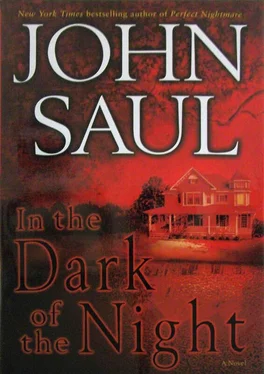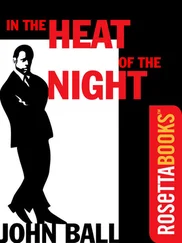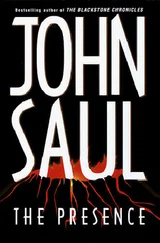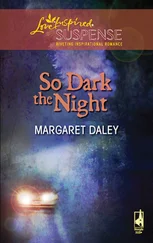John Saul. In the Dark of the Night
For Liz, with love…
THE MAN PULLED hard on the oars, every muscle in his body burning despite the chill of the autumn night.
He ignored the pain, pulling the boat out toward the middle of the lake, where the water was the deepest.
Deepest, and coldest.
Yet despite the iciness of the water and of the night, perspiration trickled from his brow and from his arms and drizzled down his chest.
Urgency spurred him onward and he pulled again, straining on the oars. His biceps spasmed in protest, but he ignored the pain. Just as he ignored the voices in his head. The ones that commanded him to turn the boat around.
But he wouldn’t do that. No matter what happened — no matter how much strength the voices gained or his muscles lost — he would stay the course he’d set.
He focused on the objects that lay toward the bow in the bottom of the boat. An old crawfish trap, its mesh torn but still strong enough to serve its purpose.
The float for the trap, even older than the trap itself, was secured to the trap with far too short a length of cheap polypropylene line. That wouldn’t matter, either — the trap would be heavy enough to pull the float down.
Especially after he added the two concrete blocks he’d brought along, just to be sure.
Just to be absolutely sure.
The voices in his head were shouting now, with one voice rising to a shriek so loud he felt his skull might burst.
He pulled on the oars one last time, then let the boat drift. As it slid silently through the water, it rocked gently, and somehow the quieting motion silenced even the voices in his head.
Then the rocking stopped and the voices roared back to life. As if sensing what was about to come, they rose once again in a raging howl of protest.
But the man continued to carry out the plan he’d rehearsed so many times in his head and twice again in the boat itself.
He shipped the oars and reached into his coat pocket.
With trembling fingers, he pulled out a heavy piece of metal and rubbed his thumb across its edge.
The sharpened steel glinted in the autumn moonlight, shining as if from a fire deep within its core.
As if it had a life of its own.
One of the voices — the woman’s voice — rose once more, but he closed his mind to it, willing himself not to give in. His hands shaking now, he dropped the glittering steel into the bottom of the trap. The voices shrieking ever louder, he closed and latched the trap’s cover.
“No one will ever find you again,” he whispered.
The voices heard, and the keening swelled in his head, hammered at his soul, threatened to tear his mind asunder.
“Stop,” he whispered, “please stop.” But he knew begging would only make it worse.
They would sense his weakness.
They would think they were winning.
They would not win.
Quickly, he threaded the end of the rope first through the frame of the trap, then through the centers of the two cement blocks in the bottom of the boat. Finally, he turned the rope back on itself to secure the free end in a series of half hitches, but the voices tore at him as he worked, distracting him from what he was doing, and in the cold of the night his hands began to go numb. The rope slipped from his fingers, and he groped in the darkness until he found it again.
He shook himself violently, trying to rid himself of the voices as a dog would a coat full of water. The boat rocked wildly, and for a moment he thought he might pitch over the gunwale into the depths of the lake, but his hand closed on the oarlock at the last moment and he steadied himself. Still trying to shut out the screaming voices, he worked faster, fumbling with the rope, twisting it first one way, then another.
Then at last he was done, and he yanked the last knot so tight he heard himself gasp.
And in that gasp, he heard his own voice.
His last scrap of humanity.
It had been a long time since he’d felt human.
Since he’d had even a memory of who he really was.
The cacophony of screaming voices had long ago drowned out all but the last vestiges of the man he had originally been.
Yet now, with the rope still burning in his fingers, those final vestiges of his humanity gave him strength to resist the commands of the voices. Keeping the boat carefully balanced, he lifted the crayfish trap and the cement blocks so they were balancing on the gunwale.
Sensing what was about to happen, the voices rose once more, the woman’s voice towering over the rest as she roared her fury at what he was doing.
He felt his resolve weaken, and reached for the trap as if to pull it back inboard. Then, in the instant before his fingers closed on the trap’s mesh, he found one last scrap of strength. “You…will…not…win,” he breathed, and with a quick shove, tipped the trap and the blocks into the water.
The rope followed the blocks overboard, its coils racing into the depths, and he felt his entire body throbbing to the pounding of his heart.
He’d won.
But even as he felt the flush of victory, the rope went taut and he felt it jerk on his waist. Before he could react — before he could reach for the oarlock that had saved him a few moments ago — he plunged over the side and into the freezing water.
Too dark! It had been too dark, and when he’d fumbled with the rope, he’d somehow tied it around himself!
“Too bad,” the woman’s voice mocked. “We told you not to! We told you! But we don’t need you. There are others. There will always be others.”
Others? Had he not stopped it all? Had he not stopped them forever?
He began tearing at the rope that was bound around his waist, his cold fingers clawing at the wet hemp, but he couldn’t even find the knots, let alone untie himself.
He was going down too far, and far too fast. Pressure was building in his ears, a pressure that exploded into a piercing pain, as if an ice pick had been plunged into his head.
He gasped and choked as the dark, cold lake water rushed into his throat.
And now the woman was laughing.
Then, just when he thought it was too late — at the instant when he would have plunged irrevocably into the darkness — he thought he felt the coils around his waist begin to loosen….
THE HANDS ON the classroom clock were crawling far too slowly toward the weekend. Eric Brewster fidgeted in his seat as Mr. Smallwood reiterated the English assignment, but Eric wasn’t paying much attention. Everybody in class — everybody in school — had spring fever, including the teacher, and Eric was certain that nobody intended to do much homework, any more than Mr. Smallwood expected it would get done. Not tonight, not this weekend, not next week, which was the last week of school before summer vacation.
When the bell rang, Eric was out of his seat, out the door, dodging fast-moving bodies as he made his way to his locker to dump his books. Long summer evenings weren’t made for studying, and he was already thinking about the possibilities when Kent Newell started working the combination to the locker next to his. Which meant that Tad Sparks, the third member of the triad that had formed in kindergarten and was still thriving in the next to last year of high school, wouldn’t be far behind. When any two of them were together, the third was sure to be close by.
Except in summer, when the Newells and the Sparkses headed for rented summer houses in Wisconsin, while the Brewsters sweated it out in Evanston, just barely north of Chicago, and, where they lived, not quite close enough to Lake Michigan to catch whatever cool breeze the water might conjure up. But maybe this summer would be different. This summer his parents were looking for a summer rental, too. Of course, so far the looking had proved futile. It seemed every house at Phantom Lake had been rented months ago, and the ugly possibility that he might be stuck without his friends for another summer was starting to seem like an even uglier reality.
Читать дальше












